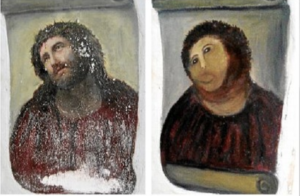Have you ever heard the tale of the elderly woman who wanted to restore an old painting and… well, didn’t?

Meet Potato Jesus. The woman’s intentions were noble. I certainly respect her heart. But that doesn’t change the fact that she is not an artist and did not restore Martinez’s work. Just because she intended to do something and thought she was able, that didn’t turn her into an artist. Desire and good intentions aren’t enough.
Nowadays, anyone can set up a page and identify as whatever they want. But taking a name for ourselves doesn’t make us that thing. We still have to be it or become it.
Two Ways to Identify
We can identify ourselves in two ways: “I’m x, and by that, I mean this,” and “I’m x, and I think this word accurately fits or describes x.” Too often, people identify as something because they think that’s how they are supposed to identify, and then they try to describe it. I think a better way would be to figure out who and what we are, then figure out what best names or describes that. This will prevent us from accidentally using words that don’t really fit.
I’m a human. I am a member of the human species, so human is an accurate word to describe me. But I’m also a hobbit. I’m kind of short, round, a little hairy, and I love food and books. I’m also part Scottish but don’t identify as Scottish: I am not a Scotsman. I have some lineage through some ancestor, but I’m not from Scotland, I don’t speak Scottish or Gaelic (or any other dialect/language from there), I don’t wear kilts, I’ve never been there, neither of my parents have ever been there (I think?). So, it would be true to say I have a Scottish history, but not that I am Scottish. Calling me Scottish would give more incorrect information about me than correct information.
Let’s move from regular descriptions to something more controversial: religion.
Religious Identity
The word “Muslim” means “submission” or “submission to God.” I don’t, however, follow Muhammad or Allah of the Qur’an. So even though the definition, “submission to God,” is technically a fitting description of me, “Muslim” would not be a good description of me, nor do I feel it would be respectful to Muslims for me to use that term.
But Christian is a good description of me. Why? What’s different? That requires a little history:
The word Christian comes from the Greek word christos, or maschiach in Hebrew, meaning the “Messiah” or “the anointed one.” The Messiah refers to the character foretold by the prophecies given by Israelite poets and prophets found in the Jewish Tanakh, or Old Testament. As a Christian, I believe Jesus fulfilled those prophecies and is the Anointed One, the Jewish Messiah. That’s why I call myself a Christian, a follower of Jesus the Christ who fulfilled those prophecies.
That’s why I believe using the word Christian to describe me is appropriate.
Why do you identify as a Christian?
If you identify as a Christian, why? What about your beliefs or life makes you think, “Christian is a good description of what I believe and do”? Let’s take a few example answers to see why this is important:
- I read my Bible. As a Christian, I’m glad you do! But I already read Harry Potter, and that doesn’t make me a wizard. While some things would be so much easier with a little accio, that’s not quite how this works.
- I go to church on Sundays. Okay, but what about that is different from a social club? Is there any other difference in your life? If we took out that one hour and just looked at the rest of your life, would “Christian” still describe you?
- I raised my hand and prayed a prayer. A marathon is 26.2 miles long, named in honor of a messenger’s run after the battle of Marathon. To qualify as having run a marathon, someone has to do two things: 1) stay within the race course and 2) finish the race. Are you still running?
Let’s try some harder questions:
- I believe in Jesus’ teachings about love. Okay, but so do Muslims. And so do some Hindus; Gandhi is famously quoted with, “I like your Jesus but not your Christians.” Even many atheists like Jesus’s teachings about love.
- I welcome everyone just like Jesus. So do Buddhists. So do telemarketers.
- I give to the poor. So do Muslims. And so do atheists.
What about those (and so many similar answers) is best, or accurately, described by the word Christian? Any?
Let’s try something different: I trust Jesus with my life. Okay, now we’re getting somewhere.
So, if those answers won’t work, what will? Let’s see what the earliest historical records about Jesus talked about:
- Jesus’ identity: which Jesus are you following? The Jewish Messiah as prophesied by the God of the Old Testament? Or just a good man who said some nice things?
- Jesus’ activity: the first Christian creed recorded specifies not Jesus’ charity but His crucifixion. We don’t identify as followers of Bill Gates or Gandhi for giving to the poor; what did Jesus do that merits His name?
- Jesus’ exclusivity: Jesus very clearly taught one path, one way to the Father; either you’re on that path, or you aren’t on the path of Jesus.
So, Why do you identify as a Christian?
Editor’s Note: If you have read this far, and now you’re not sure what it means to be a Christian or if you’re a Christian, then there’s no time like the present to make it right. You can trust in the Biblical Jesus to forgive you, to save you, and lead you. “Salvation is found in no one else, for there is no other name under heaven given to mankind by which we must be saved” (Acts 4:12). You can also go here to find out more: “A Simple Explanation of How to Be Saved”. Trusting your life in Jesus’s hands is like a gateway into a whole new world, complete with a new outlook on life, a new way to live, and a new hope for the future. Please make sure, today, that you are right with God
Footnotes:
Recommended resources related to the topic:
Jesus, You and the Essentials of Christianity by Frank Turek (INSTRUCTOR Study Guide), (STUDENT Study Guide), and (DVD)
How to Interpret Your Bible by Dr. Frank Turek DVD Complete Series, INSTRUCTOR Study Guide, and STUDENT Study Guide
Can All Religions Be True? mp3 by Frank Turek
How Can Jesus be the Only Way? Mp4, Mp3, and DVD by Frank Turek
Another Gospel? by Alisa Childers (book)
__________________________________________________________________________________________________________________________________________________
As a Christian apologist, David Wolcott has contributed research to Mama Bear Apologetics, Alisa Childers, Natasha Crain, Crossexamined, and more. Focusing on primary-source research of Progressive Christianity and understanding the Bible in the original cultural contexts, he is on a four-year plan to learn how to read eight languages, including biblical Hebrew and koine Greek. David is an avid reader of all kinds of books, and is passionate about helping Christians learn to apply the wisdom shared through many excellent books via his Academy at thedavidwolcott.com.



















Facebook Comments